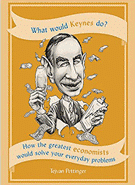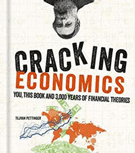I am currently writing a book on economics. The target audience is:
- People who want to understand economics, especially economics which features in the news.
- Non-academic, though would be good summer reading for students.
Features
- As much as possible it will avoid technical jargon and be accessible to non-students of economics.
- It will answer commonly asked questions on economics (e.g. who does the government borrow from, why don’t we print more money, does technological change cause unemployment).
- It is all unique content (it is not duplicated from this site, though I’ve had a lot of practice writing on these topics.
- Explaining common newspaper headlines.
- The hope is that it will explain economics to anyone who has never studied it (or studied it many years ago and would like a refresher course)
- There is a degree of overlap with my basic A Level – Economics Revision Guide. However, since there is no exam to pass, I feel much more freedom in writing the easiest way to explain and not to be constrained by any syllabus.
If you have any economic questions, you’ve always wanted answered I would love to hear them!
You can fill in contact form or leave a comment on this post.
It would be nice to get a publisher interested, rather than just rely on e-book format, so if you happen to be a publisher wanting to publish a guaranteed best-seller, feel free to contact 🙂
I appreciate this won’t be the first-ever book which has attempted to explain the wonderful world of economics but having taught a huge variety of students for 10 years and writing an economics blog I’ve got a good idea on what I’d like to get across.
Update 2020
I did write two books
What would Keynes Do? – interesting anecdotes and perspectives on everyday life from the perspective of great economists.
Cracking Economics– A visual guide and explanations – from £6.99



1) Why do central banks target the rate of inflation rather than nominal GDP?
2) What are the effects of cutting government spending when real interest rates on government debt are near zero or negative?
3) What are the macroeconomic consequences of giving away 0.7% of GDP a year in aid?
4) Should monetary policy target core or headline inflation?
5) What is the optimum and maximum sustainable level of public debt, for a countries with a floating or fixed exchange rate.
6) What are the effects of long term unemployment and what can governments do to reduce it?
7) How can countries in a currency union stablise their current account deficits and surpluses?
thanks for good questions ASDASD
I think this is an interesting idea – and one I have been thinking about for some time.
I’d be happy to talk to you about a joint venture…
regards
chris
It would be great if you manage to publish an audiobook version too. I would definitely buy that.
Here’s my no. 1 economics question: If a national government’s sole aim was to utterly overcome all competing states, would it rationally prefer a planned economy over a capitalist or semi-capitalist economy, since that way it could direct all resources towards its power-mongering ends, rather than see them squandered on entertainment products and suchlike. If not, why not?
Hi. what happened to your book?
https://www.economicshelp.org/shop/cracking-economics/